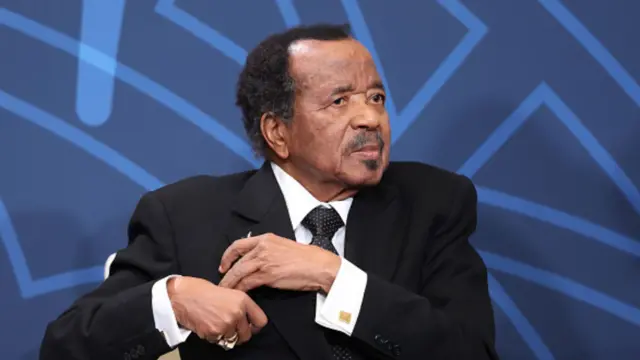Headlines
Court Stops EFCC, ICPC, DSS from Probing Saraki

The Federal High Court in Abuja on Tuesday restrained the Economic and Financial Crimes Commission and other agencies involved in the probe of Senate President Bukola Saraki over corruption allegations.
Saraki on Friday filed two separate fundamental rights enforcement suits before the court to challenge the decision of the EFCC to seize his houses.
Ruling on an ex parte application filed along with the substantive suit by Saraki, Justice Taiwo Taiwo, on Tuesday ordered the anti-corruption body and the other five respondents to the suit to stay action on the probe pending the hearing and determination of the motion on notice filed by the applicant.
The judge made the order after hearing Saraki’s lawyer Sunday Onubi, who moved the application.
The six respondents to the suit affected by the restraining order are the Attorney General of the Federation, Mr Abubakar Malami (SAN), Department of State Services, Inspector-General of Police, Muhammed Adamu, EFCC, Independent Corrupt Practices and other related offences Commission and Code of Conduct Tribunal.
In a ruling delivered by the judge on returning to the courtroom after taking about 45 minutes to prepare it in his chambers, the court likened the restraining order issued on Tuesday to an order directing the parties to the suit to maintain the status quo in respect of the probe.
Ordering them to suspend the probe, Justice Taiwo said he granted Saraki’s prayers to avert a situation where the court would be faced with a situation of fait accompli.
He added that granting the order was in line with a settled principled of law that once a suit was filed, all parties to it must refrain from taking any action capable of rendering the suit nugatory.
According to him, the order amounts to an order directing the parties to maintain the status quo.
He added that the law allows such an application to be granted in a situation where the applicant would likely face “hardship” between the time of serving processes in the suit on the respondents and hearing and determination of the suit.
He ruled, “There is no doubt that the Fundamental Rights Enforcement Procedure Rules 2009 is a special proceeding with its stated rules and procedure.
“By the provision of Order 4(3) of the Fundamental Rights Civil Procedure Rules, 2009, the court may, if satisfied that the applicant may be caused hardship before the service of an application where liberty or life of the applicant is involved hear the application ex parte upon such interim reliefs as the justice of the application may demand.
“There is no doubt that in making the interim reliefs or orders, the court is guided even in its exercise of its discretion judicially and judiciously applied by the law and statues.
“Here comes in the rules and of course Constitution of the Federal Republic of Nigeria.”
He added, “I am of the view, after due consideration of the aforesaid averment, that this court ought to make the order being sought by the applicant pending the hearing and determination of the originating motion on notice.
“To do otherwise and not to restrain the respondents by asking them not to stay action will result in the court being faced with a fait accompli.”
The judge made the same set of orders in the two separate suits marked FHC/ABJ/CS/507/2019 and FHC/ABJ/CS/508/2019, filed by Saraki, which were separately argued and ruled upon on Tuesday.
Justice Taiwo then directed the applicant to serve the court processes on the six respondents who he also directed to file their response within five days of being served.
He adjourned further hearing till May 23, 2019 when the respondents will have an opportunity to challenge the ex parte order by arguing their objection to Saraki’s motion on notice.
The Punch
Headlines
Ezekwesili Accuses Tinubu of Running Intolerant Govt, Shrinking Civic Freedom

A former Minister of Education, Dr. (Mrs) Obiageli Ezekwesili, has accused President Bola Tinubu’s administration of suppressing civic freedoms and eroding citizens’ rights.
In a statement shared on X (formerly Twitter) titled “A Memo to Nigerians: A Call to Collective Voice on the Shrinking Civic Space and Erosion of Citizens’ Rights in Nigeria,” Ezekwesili condemned what she described as a “deeply troubling trend” of growing state intolerance and repression of dissent.
She urged President Tinubu to immediately direct the Inspector-General of Police to release activist Omoyele Sowore and his colleagues, who were recently detained.
Ezekwesili also called on Lagos State governor, Babajide Sanwo-Olu, to publicly apologise to EiE Nigeria’s Executive Director, Yemi Adamolekun, and activist, Ms. Nafziger, over their reported harassment during a peaceful #EndSARS memorial event.
“The latest wave of actions against citizens by state security agencies reflects a deeply troubling trend — the steady shrinking of civic space and erosion of citizens’ fundamental rights in our democracy,” she wrote.
The former minister cited three recent incidents — the harassment of Adamolekun, the police clampdown on protesters demanding Nnamdi Kanu’s release, and the repeated arrests of Sowore despite a valid court order — describing them as evidence of “a dangerous pattern” of intolerance and abuse of power.
According to her, the Tinubu administration has become “intolerant of dissent, allergic to accountability, and fearful of citizens’ voices.”
“It is clear that President Tinubu is running a government and security apparatus that are increasingly intolerant of dissent. True strength of a government lies not in silencing critics, but in protecting those who speak truth to power,” she stated.
Ezekwesili urged Nigerians to defend their democratic rights, stressing that sovereignty belongs to the people, not the government.
“Nigeria’s democracy cannot survive on the silencing of conscience. Every act of repression against one citizen diminishes the liberty of all,” she warned.
”We must collectively safeguard our right to speak, assemble, and demand accountability. Our democracy must not become one without citizens.”
Headlines
US Govt Revokes Wole Soyinka’s Visa

The United States government has revoked the non-immigrant visa of Wole Soyinka, the Nobel laureate.
In a letter dated October 23 and signed by the US consulate-general in Lagos, Soyinka was directed to present his passport at the consulate for physical cancellation of the visa.
Soyinka spoke during a media parley held in Lagos on Tuesday, where he read excerpts from the official correspondence sent to him.
“This letter serves as official notification by the United States Consulate General in Lagos that the nonimmigrant visa listed below has been revoked pursuant to the authority contained in U.S. Department of State regulations 22 CFR 41.122 and is no longer valid for application for entry into the United States,” the letter reads.
The Nobel laureate said he could not identify the specific offence that led the revocation of his visa by the US government.
Soyinka said he applied for the visa after he received a letter from the US Internal Revenue Service about an audit for tax returns.
He explained that his trip was to resolve the tax issues, adding that he wanted to prevent a situation where the US might advertise him as a “tax dodger” to the world.
Soyinka made reference to how he discarded his US green card after President Donald Trump assumed office in his first term.
The Nobel laureate said he wondered whether his visa was revoked because he described Trump as “Idi Amin in white face”.
“It is necessary for me to give this press conference so that people in the United States who are expecting me for their event, not to waste their time. I have no desire,” he said.
“It is necessary for me to give this press conference so that people in the United States who are expecting me for their event, not to waste their time. I have no desire,” he said.
“I have written a lot of plays about Idi Amin. Maybe it is about time I also write about Donald Trump. Literary compliment. Maybe he would reconsider and restore my visa.
“I want to reassure the US Consulate that I’m very contend with the revocation of my visa. Individual citizens are free to interact with me.”
In September, Soyinka said he would not honour an invitation by the US consulate in Lagos for a visa interview scheduled for September 11, 2025.
TheCable
Headlines
World’s Oldest President, Paul Biya, Wins Cameroon Election at 92

Cameroon ’s top court on Monday declared incumbent Paul Biya, the world’s oldest president, the winner of the Oct. 12 election. Clashes with security forces left at least four protesters dead ahead of the announcement as opposition supporters rallied to demand credible results.
Biya, 92, has led the central African nation since 1982. The Constitutional Council said he received 53.66% of votes while former ally-turned-challenger Issa Tchiroma Bakary got 35.19%. The turnout was 57.7%.
In a social media post after the declaration, Tchiroma said that there was gunfire directed at civilians and two people were shot dead in his hometown in Garoua.
He said: “Toll of their attack: two dead. I wonder what will be said this time? Shooting point-blank at your own brothers — I can’t help but wonder if you’re mercenaries. Kill me if you want, but I will liberate this country by any means necessary. What blatant impunity.”
The four protesters were shot dead in Douala, the economic capital, on Sunday, as hundreds of people stormed streets in several cities. Tchiroma had claimed victory days before Monday’s announcement, citing results he said were collated by his party. Biya dismissed the claim.
According to Samuel Dieudonne Ivaha Diboua, governor of the Littoral Region that includes Douala, several members of the security forces were injured by protesters. He said at least 105 protesters were arrested.
Dozens of opposition supporters, activists and leaders have been arrested in recent days. Paul Atanga Nji, minister of territorial administration, said on Saturday the government arrested several people plotting violent attacks.
One protester, Oumarou Bouba, a 27-year-old trader in Maroua, said: “I am ready to stake my life to defend my vote. I voted for Tchiroma because I want change.”
Following the announcement of the results, Sani Aladji, a 28-year-old who works in a hotel in Maroua, said: “Nothing will change. I expected that Issa Tchiroma would bring change, which is why I voted for him. There’s rampant corruption under Biya’s regime. We are tired of that. We don’t have roads.”
Biya has ruled Cameroon longer than most of its citizens have been alive. Over 70% of the country’s almost 30 million population is below 35. The election has been the latest dramatic example of tension between Africa’s youth and the continent’s many aging leaders.
He first came to power in 1982 following the resignation of Cameroon’s first president and has ruled the country since then, later benefiting from a constitutional amendment that abolished term limits.
Critics accuse Biya of leading Cameroon from a period of relative stability into one of crisis and conflict. The country in recent years has faced attacks by Boko Haram militants in the north and a secessionist insurgency in the country’s English-speaking North West and South West regions.
That crisis, triggered by the government’s attempts to impose French in English-speaking schools and courts, has killed nearly 7,000 people, displaced more than one million more internally and sent thousands fleeing to neighboring Nigeria.
Despite Cameroon being an oil-producing country that is experiencing modest economic growth, young people say the benefits have not trickled down beyond the elites. According to World Bank data, the unemployment rate stands at 3.5%, but 57% of the labor force aged 18 to 35 works in informal employment.
“Many young people across the country and in the diaspora had hoped for change, but that their hopes have been dashed. It feels like a missed opportunity,” said Dr Emile Sunjo, a senior lecturer in international relations at the University of Buea. “Cameroon could potentially slide into anarchy.”
Source: AP






